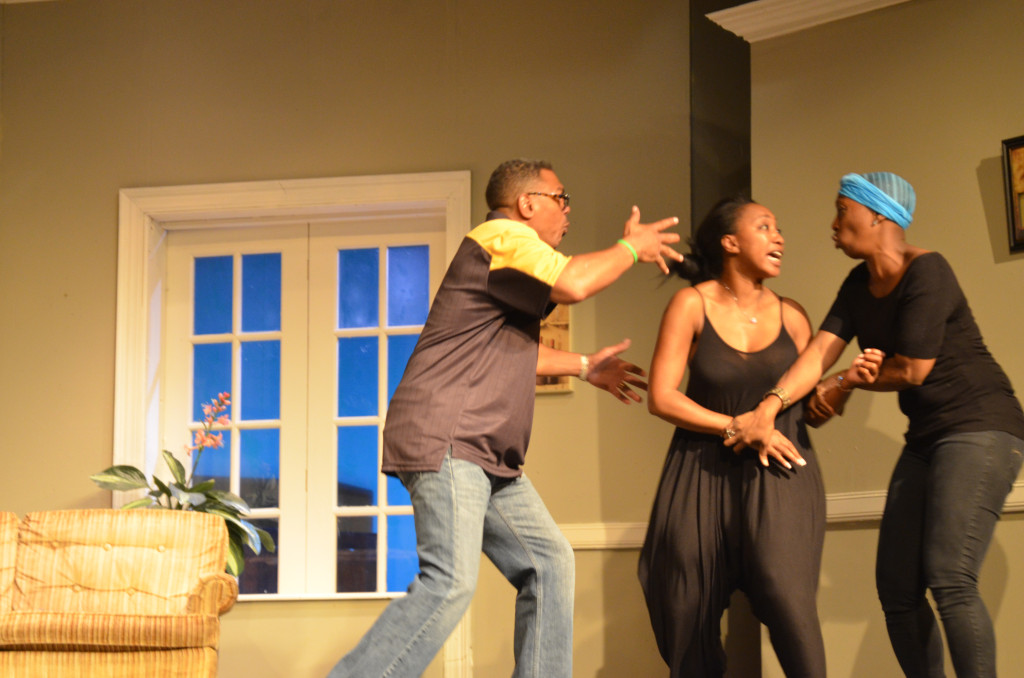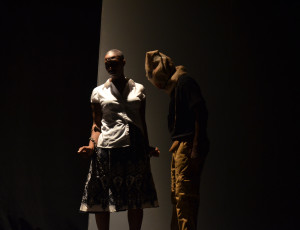
In a room where everyone else is whispering, ASYLUM screams at the top of its lungs: “Listen.” Written by playwright and novelist Cheril N. Clarke and directed by Kash Goins, the play asks tough questions, urging its viewers to take a strong look at the world around us.
Based on a true story, ASYLUM follows Prossy Kakooza (Tiffany Barrett), a young Ugandan lesbian who is forced to flee the country to escape persecution for her sexuality. It is set primarily in Uganda, but begins and ends in the U.K., where Prossy seeks asylum on humanitarian grounds from a discouragingly apathetic British immigration judge (Michael Tamin Yurcaba).
With the action shifting back to Uganda, we follow Prossy’s last year in college and her evolving relationship with her roommate, Leah (Brennie Tellu). As the two fall more in love every day, taking romantic walks at night—masterfully executed by having Barrett and Tellu walk through the theater, one in each aisle, professing their love for one another across the audience and discussing what their future might look like—Prossy receives increasing pressure from her father, Balondemu (Steve Crum) to marry a man. Balondemu walks in on his daughter and Leah sharing an intimate moment and the play’s tone shifts dramatically. A developing love story becomes something much darker and unsettling. As “punishment,” Prossy is exposed to brutal violence rarely seen on stage:taunting, torture, and rape.
A great team of actors enhance this moving and well-written play. Barrett conveys the crushing weight of Prossy’s circumstance. For example, when Prossy’s father, knife in hand, rips Leah from her arms, Barrett’s hysterical breakdown–her yells and her shaking–pierces the viewer with the reality at hand. She does this so effectively that, at curtain call, I heard a shy voice ask quietly, “So wait—is that really Prossy?” I was reminded of Flannery O’Connor’s advice, “to the hard of hearing, you shout, and for the almost blind, you draw large and startling figures.” The artist must sometimes present a scene as graphically as possible to penetrate the blissful ignorance of the audience. ASYLUM—candid and brutal—does just that.
Tellu’s performance as Leah is also moving. The character serves almost as an allegory for all that is good, and Tellu makes that very physical, very human. When we first meet Leah, she jokes with Prossy about their past boyfriends over a bottle of wine. Before there is any clear indication that the two will fall in love, the way Tellu smiles at Barrett and the amiable tone of her voice convey the character’s deep caring. When Leah laughs wildly and dances freely, we get a sense of someone who is not afraid to love with reckless abandon. Barrett’s Prossy reciprocates this apparent fondness, though in a much more conservative way–expressing a borrowed outrage when asked if she has ever kissed a woman, but then kissing Leah all the same. This chemistry between the two women is powerful, and the actors fluently embody the dramatic shifts in tone that the play undergoes.

Prossy and Leah’s story makes visible the deadly prominence of homophobia in Uganda. People like Moses and Balondemu treat lesbians as “a mistake of nature.” Clarke’s writing takes a bold stance against this perspective. Leah stands strong in defiance, explaining to Prossy that she intends to embrace her sexuality and her feelings for Prossy, regardless of the consequence.
The play also critiques a harrowingly male-dominated society. Balondemu and Moses caricature male privilege and insecurity, subverting concepts such as honor and dignity and showing us the roles they play in a violent patriarchy. Balondemu champions these qualities, at least on the surface, but then he brutally beats his wife. Moses, Leah’s intended husband, rationalizes to himself beside a beaten, unconscious Leah, “I cannot be wrong for my behavior here.” He claims integrity, but cannot take responsibility for his own weakness. Masani serves as the focal point of the devastating effects of a society in which women are subjugated and forced to see themselves as “only a woman, no more than a child.” The author bravely combats this mindset. In prison, when Leah is violently mistreated and told to be obedient she spits into the guard’s face and states loudly and clearly “I will never respect you.”
ASYLUM surprised its viewers numerous times. Instead of the traditional curtain call, rather than having the actors take a bow, they remained in character, updating the audience on where they are now as people (dead or alive). As a viewer invested in the facts of this play, I was pleased with the decision to give the audience a sense of closure. We also hear from antagonistic characters, like Prossy’s father, who, with a stern expression announces that he means each of those words, “I have no regrets.” This unusual curtain call reinforces the raw, honest nature of the play, depicting exactly the kind of people that young women like Prossy are up against to this day.
Given the caliber of the performances, one might suspect the actors heard the story directly from Prossy Kakooza. However, the only people in the theater to experience that privilege were the playwright Cheril N. Clarke, and her wife Monica Bey-Clarke. After hearing about a petition to help Kakooza, Clarke corresponded with her and, eventually met her and Leah in Manchester, England, where they discussed Kakooza’s story in detail. In a PGN interview with Phindie writer Henrik Eger, Clarke described the experience, “It was one of the most amazing moments of our lives to be in their presence — two women who looked like us and loved like us, but who had almost paid the ultimate price for their love. Their courage and strength made an indelible impression on us, and we’re grateful to have crossed paths with them and be able to tell their story.”
“Fearless” is a word thrown around so often that we may neglect its weight, but ASYLUM is fearless. The play is not afraid of its sexuality; not afraid to make bold statements about a male-dominated society in Uganda—and even here in the West; not afraid to stand up for what is right. It is honest and earnest. We could never know the horror it conveys, but, by the time I left the theater, I felt it strongly.
ASYLUM is unapologetic and incredibly human. It is the loud shout of an artist that we need to address a massive injustice happening in our world, in our own time. [The Stagecrafters Theater, 8130 Germantown Ave] July 24-26, 2015; asylumtheplay.com.
- Henrik Eger’s interview with playwright Cheril N. Clarke on PGN and Drama Around the Globe.
- Visit Clark’s website at cherilnclarke.com.
- Phindie‘s preview of ASYLUM.

I was fortunate to see the premiere of this play in a small and intimate theater in New York. The proximity of the actors, and the action, gave one the sense of almost being a voyeur watching the future lives of these characters unfold. No matter who you were, you left the theater knowing you had witnessed something important and meaningful; and you would never be the same. All can identify with wanting to love and be loved. This play gave us a glimpse of what that can mean for some and what they will go through to obtain it. I cannot wait for it to come to Atlanta.
Thank you, Sandra! I hope to bring Asylum to Atlanta in the future.